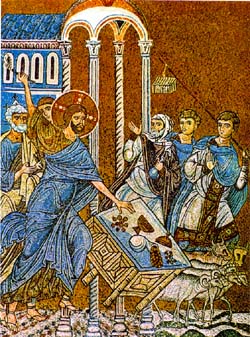
No doubt many of you in Ireland will have heard of the TD (member of the Irish parliament) who has been told by his parish priest that he can no longer serve as an Extraordinary Minister of Holy Communion following his support for the recent abortion bill. The TD, as has become the norm now, has gone to the media to express his woes and pain. In one article he is quoted as saying that he is horrified by attempts to intimidate him by "ultra right-wing elements in the Church" (by which I presume he means Catholics who reject abortion). It also appears that the same TD was using Church premises to hold his clinics (where a TD meets constituents) and he has now been told that he can no longer do so.
First of all no TD should be permitted to use Catholic Church property for meetings. Given we hear so much of the separation of Church and State, Catholic parishes should never facilitate politicians in their political work regardless of who that politician is, upstanding parishioner or not.
Secondly, I understand why the TD in question does not realise why he cannot be pro-abortion, or at least support the introduction of an abortion bill, and not continue to be a Minister of Holy Communion. Given that the Church representatives in Ireland, and many other places, have dodged the issue of abortion and the consequences for Catholics who support and facilitate it, it is understandable that there is a lot of ignorance out there.
Thirdly, what this TD's parish priest has done is entirely correct: this TD, having facilitated the introduction of abortion into this country, can no longer serve as an Extraordinary Minister of Holy Communion at Mass nor should he be receiving Communion at all, not until he has made a public repudiation of his position having sought the Sacrament of Confession and perhaps even after doing some public form of penance. The same goes for all Catholic TDs in the Dail who supported the bill. Whether they like it or not they had a choice and they made the choice to support the bill and that has consequences for their souls and for their place in the Church.
Reading what the TD has to say I get the impression that he thinks he has a right to be an Extraordinary Minister of Holy Communion and that the priest has no right to exclude him. This attitude is not unknown in Ireland today as some of those who are Extraordinary Ministers do actually believe it is their right. This again is not always the fault of lay people who serve in this role, but rather reveals another failing at the heart of the Church in Ireland - another failure of catechesis. No one has a right to be an Extraordinary Minister, it is a role whereby lay people may assist the priest with the distribution of Holy Communion at the priest's request if he honestly recognises that the distribution of the Eucharist will take an inordinately long time. There are a lot of conditions in there you'll note. But they are the conditions laid down by the Church for this role.
Finally I note with interest, in the Irish Independent's article on this issue, what the spokesman for the Irish Bishops had to say - there is no diktat with regard to politicians and Communion nor to their current relationship with the Church i.e. excommunication. There is a terrible fear in many Churchmen today to confront and challenge, a fear of offending people and a fear of the media. Walking the tightrope between pastoral charity and defence of the faith can sometimes be a precarious thing, but it is certainly made more difficult when it is being conducted down in the trenches with heads held as low as physically possible.
There are times when the truth most be proclaimed and action taken even if it offends people, even if people leave the Church, even if it means the media are going to drag you through the newspapers - that's the price we have to pay for proclaiming the Gospel. If Jesus had stayed in the trenches he would never have been crucified, and we would not have been redeemed. And today, how many souls are being lost because Churchmen and women are afraid to proclaim the truth? If that TD had heard the Gospel of Life properly proclaimed he may well have been aware of the choice he was making on the day of the vote and the consequences for him with regard to the Church. He may well have made the same choice but he would have been under no illusion that things could dandy along as per usual unchanged. But then again he may have thought twice about it and may have chosen life instead of death.
On this issue I would suggest a good meditational reading of St Augustine's Sermon to the Shepherds (Office of Readings, Monday Week 24 to Thursday Week 25).


